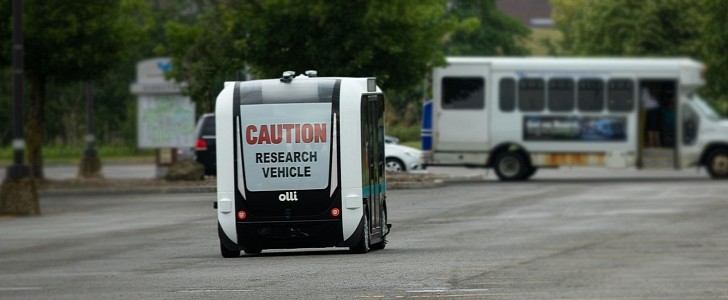There’s probably not a lot of trust when it comes to self-driving vehicles riding without a safety operator, and even more so for trucks, buses and various shuttles. But that’s where things are headed, and one of the possible answers for the safety issues could be a great 5G network.
Everybody agrees that autonomous vehicles should be monitored somehow, when they’re on the road. So far, onboard safety attendants have been in charge of this, making sure that the vehicle’s status is always in good conditions. But, eventually, they will be replaced by a centralized monitoring station, able to control an entire fleet of vehicles, as long as it can receive information in real-time. This is where 5G networks play an important part.
Robotic Research, the creator of an autonomous driving technology, among other things, is participating in an autonomous shuttle pilot project at the U.S. Marine Corps Air Station (MCAS) Miramar, in San Diego, together with Verizon Public Sector.
The plan is to use Local Motors' autonomous shuttle, Olli, equipped with Robotic Research’s autonomous driving technology, to transport people and packages around MCAS Miramar. And, Verizon’s 5G Ultra Wideband will transmit all the data collected by the shuttle to Robotic Research’s storage service. This way, the company’s nSight Review system can perform data analytics to improve the way the self-driving shuttle operates.
Verizon Public Sector and MCAS Miramar first started working on 5G-enabled innovations last year, when a 5G Ultra Wideband was deployed on a military base for the first time ever. Since then, they collaborated with several other partners, in order to test what 5G can do to improve AI and drone-related projects.
Now, with the help of Robotic Research, the 5G Living Lab at MCAS Miramar will be testing an autonomous shuttle. For 90 days, sensor data from the vehicle will be sent to the nSight™ Vault storage service, through Verizon’s 5G Ultra Wideband, and then analyzed by the nSight Review system.
The results will be presented during the Electric Mobility Symposium, which will take place at MCAS Miramar, on June 24.
Robotic Research, the creator of an autonomous driving technology, among other things, is participating in an autonomous shuttle pilot project at the U.S. Marine Corps Air Station (MCAS) Miramar, in San Diego, together with Verizon Public Sector.
The plan is to use Local Motors' autonomous shuttle, Olli, equipped with Robotic Research’s autonomous driving technology, to transport people and packages around MCAS Miramar. And, Verizon’s 5G Ultra Wideband will transmit all the data collected by the shuttle to Robotic Research’s storage service. This way, the company’s nSight Review system can perform data analytics to improve the way the self-driving shuttle operates.
Verizon Public Sector and MCAS Miramar first started working on 5G-enabled innovations last year, when a 5G Ultra Wideband was deployed on a military base for the first time ever. Since then, they collaborated with several other partners, in order to test what 5G can do to improve AI and drone-related projects.
Now, with the help of Robotic Research, the 5G Living Lab at MCAS Miramar will be testing an autonomous shuttle. For 90 days, sensor data from the vehicle will be sent to the nSight™ Vault storage service, through Verizon’s 5G Ultra Wideband, and then analyzed by the nSight Review system.
The results will be presented during the Electric Mobility Symposium, which will take place at MCAS Miramar, on June 24.

